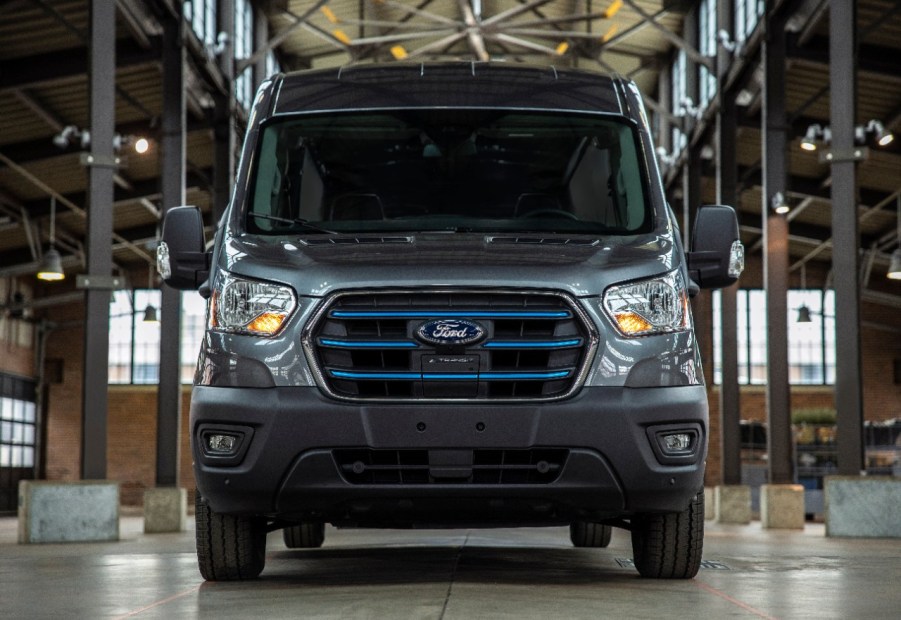
Ford Inks Deal With Delivery Company for 2,000 Electric Vans
You’d be hard-pressed to find any automaker that isn’t at least committing to some form of electrification in the coming years. Electric vehicles are more efficient and affordable today than they’ve ever been. And while the consumer markets are already making EV purchases at much higher rates, there are commercial EV applications reaping the benefits of EVs, too. Ford recently made headlines with its latest commercial deal with DHL.
Ford E-Transit electric vans are soon going to be part of the courier company DHL’s fleet in 2023. And this latest deal marks the turning of an innovative idea into a full-blown, actionable business reality. You can expect to see more EVs in cargo fleets, and not just Ford with DHL. There’s a movement happening, and electric fleet delivery vehicles are going to soon become the norm.

Ford inks a new deal DHL for E-Transit vans
Ford E-Transits are the electric versions of the blue oval’s best-selling van. And there is already a surging demand for these efficient and affordable cargo vans among small business communities.
They’re workhorses in capability and utility, now harnessed with electric motor designs intended to make them more eco-friendly and efficient. But Ford just inked a new deal on a bit of a bigger scale, beyond the small business applications of contractors and backyard service companies.
In late 2022, Ford and DHL announced a joint venture and new deal whereby Ford will deliver 2,000 electric cargo vans to the courier company by the end of this year.
ARS Technica shares additional details about the recent Ford and DHL deal, including DHL’s mission to reduce its carbon emissions in the coming years. DHL’s chief procurement officer Anna Spinelli says that “adding the Ford E-Transit to the company’s existing global electric fleet of 27,000 only strengthens DHL’s position.”
DHL, like so many other global brands, aims to be carbon neutral entirely within the next few years. Those types of public and shareholder commitments are only going to create more demand for Ford E-Transit vans and other models like them.
Electric delivery vehicles are more than just an idea now
Not too long ago, the thought of an electrified fleet of delivery vehicles would have seemed science fiction. But with this latest deal between DHL and Ford, it’s only more evident now that EV delivery vehicles are more than just an idea; they’re a reality.
The efficiency and affordability of EVs are making real dollars and cents for commercial companies. And automakers are only getting better with designs and production, allowing them to meet the surging commercial demand.
As part of the recently inked agreement, DHL has already taken partial delivery of some Ford E-Transit vans. As part of the courier brand’s “last-mile service” delivery, these Ford E-Transits are already in motion in Europe. Belgium, Germany, and the United Kingdom’s fleets are already in motion.
The future of electric delivery vehicles is bright
Ford isn’t the only automaker speaking to a commercial audience with electric delivery vehicles. Car and Driver shared a few other models coming soon, if not already launched, set to revolutionize the EV delivery movement. Canoo is planning a multi-purpose vehicle line, and GM’s subsidiary, BrightDrop, is expanding with two new delivery rides.
Amazon’s Rivian electric vans are already on the road, with new designs expected to come soon. And Tesla’s Semi is expected to innovate delivery beyond the “last-mile delivery” service, too. Other companies responsible for fleet delivery, including UPS and Walmart, are also exploring more cost-effective and eco-friendly solutions that electric delivery vehicles can provide.
This latest deal between Ford and DHL won’t be the last. The future looks bright for electric delivery vehicles, and automakers will certainly capitalize on that commercial fleet demand.


